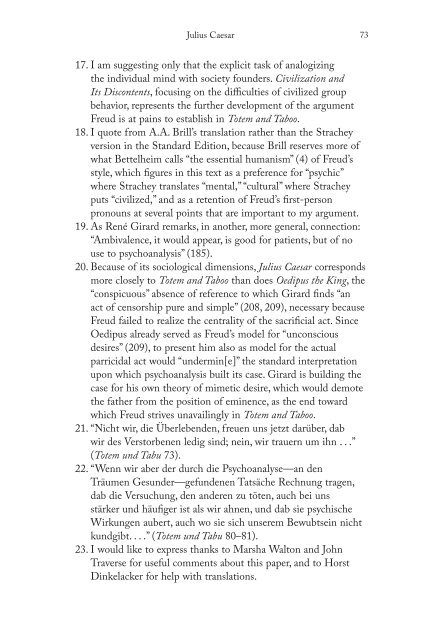Bloom's Literary Themes - ymerleksi - home
Bloom's Literary Themes - ymerleksi - home
Bloom's Literary Themes - ymerleksi - home
Create successful ePaper yourself
Turn your PDF publications into a flip-book with our unique Google optimized e-Paper software.
Julius Caesar 73<br />
17. I am suggesting only that the explicit task of analogizing<br />
the individual mind with society founders. Civilization and<br />
Its Discontents, focusing on the difficulties of civilized group<br />
behavior, represents the further development of the argument<br />
Freud is at pains to establish in Totem and Taboo.<br />
18. I quote from A.A. Brill’s translation rather than the Strachey<br />
version in the Standard Edition, because Brill reserves more of<br />
what Bettelheim calls “the essential humanism” (4) of Freud’s<br />
style, which figures in this text as a preference for “psychic”<br />
where Strachey translates “mental,” “cultural” where Strachey<br />
puts “civilized,” and as a retention of Freud’s first-person<br />
pronouns at several points that are important to my argument.<br />
19. As René Girard remarks, in another, more general, connection:<br />
“Ambivalence, it would appear, is good for patients, but of no<br />
use to psychoanalysis” (185).<br />
20. Because of its sociological dimensions, Julius Caesar corresponds<br />
more closely to Totem and Taboo than does Oedipus the King, the<br />
“conspicuous” absence of reference to which Girard finds “an<br />
act of censorship pure and simple” (208, 209), necessary because<br />
Freud failed to realize the centrality of the sacrificial act. Since<br />
Oedipus already served as Freud’s model for “unconscious<br />
desires” (209), to present him also as model for the actual<br />
parricidal act would “undermin[e]” the standard interpretation<br />
upon which psychoanalysis built its case. Girard is building the<br />
case for his own theory of mimetic desire, which would demote<br />
the father from the position of eminence, as the end toward<br />
which Freud strives unavailingly in Totem and Taboo.<br />
21. “Nicht wir, die Überlebenden, freuen uns jetzt darüber, dab<br />
wir des Verstorbenen ledig sind; nein, wir trauern um ihn . . .”<br />
(Totem und Tabu 73).<br />
22. “Wenn wir aber der durch die Psychoanalyse—an den<br />
Träumen Gesunder—gefundenen Tatsäche Rechnung tragen,<br />
dab die Versuchung, den anderen zu töten, auch bei uns<br />
stärker und häufiger ist als wir ahnen, und dab sie psychische<br />
Wirkungen aubert, auch wo sie sich unserem Bewubtsein nicht<br />
kundgibt. . . .” (Totem und Tabu 80–81).<br />
23. I would like to express thanks to Marsha Walton and John<br />
Traverse for useful comments about this paper, and to Horst<br />
Dinkelacker for help with translations.
















